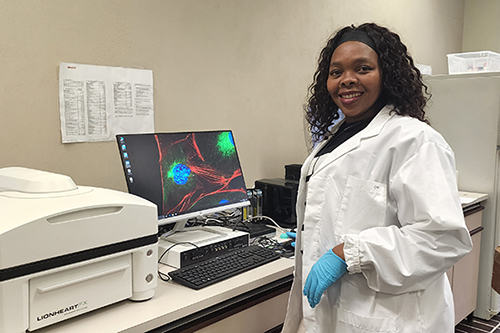Prof Sithandiwe Mazibuko-Mbeje from the North-West University (NWU) recently returned from a sabbatical in Ancona, Italy, where she conducted groundbreaking research in toxicology.
Over seven months, Prof Mazibuko-Mbeje delved into a crucial yet often overlooked area of study: the impact of toxins on human health, particularly in the development of diseases like cancer and obesity.
Her research focused on T2 toxin, a prevalent toxin, a mould byproduct in our environment with significant health implications. Using in-vitro models, Prof Mazibuko-Mbeje demonstrated the detection of toxins in human anatomy, revealing their detrimental effects on health. Specifically, she found that T2 toxin exposure induces oxidative stress and inflammation in skin cells. These toxins are found in wheat, barley, rye, oats, and maize.
However, treatment with natural products such as the moringa oleifera plant, either alone or in combination with the antioxidant coenzyme Q10 (CoQ10), mitigated these effects.
She emphasised the potential of combining moringa oleifera and CoQ10 in the development of nutraceuticals to combat oxidative stress and inflammation, thereby reducing the risk of developing various non-communicable diseases, including diabetes. However, she noted the need for further studies involving animal and human subjects to validate these findings.
This collaborative research with Prof Luca Tiano's lab in Italy highlights the interdisciplinary nature of the study and its potential for future applications in healthcare. It is interdisciplinary as in the future people who stays in farm and are in high risk of exposure will be tested for the amount of toxin as this penetrate through skins, and this study will focus on preventative measured either by food or topical cream. Her innovative approach to toxicological research offers promising avenues for developing preventive and therapeutic interventions for chronic diseases.
Beyond her recent accomplishments, Prof Mazibuko-Mbeje’s career includes being promoted to full professor in January 2024 and assuming the role of head of the Biochemistry subject group on the Mahikeng Campus. She received the Highly Promising Next Generation Researcher award from the NWU in 2023.
One notable collaboration has been with one of her students, Khanyisani Ziqubu, whose research focuses on brown and beige adipose tissues. These thermoregulatory organs have implications for obesity and type 2 diabetes, offering potential insights into their pathophysiology and biomarkers.

Prof Sithandiwe Mazibuko-Mbeje is an expert in toxicology.
